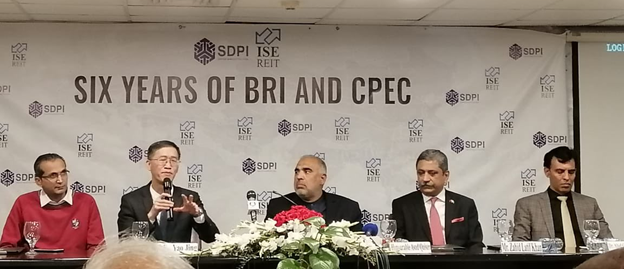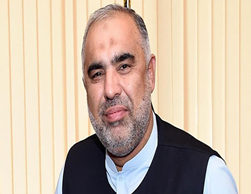Six Years of Belt and Road Initiative (BRI) and China Pakistan Economic Corridor (CPEC): Special Seminar held
Go Back

A special seminar titled; “Six Years of Belt and Road Initiative (BRI) and China Pakistan Economic Corridor (CPEC)” was organized by the Sustainable Development Policy Institute (SDPI) in collaboration with Islamabad Stock Exchange (ISE) on February 6, 2020 at ISE Building in Islamabad. H.E. Mr. Asad Qaiser, the Speaker of National Assembly of Pakistan was the Chief Guest of the seminar, attended by the Ambassador of China to Pakistan, the Ambassadors of various ECO Member countries including Kyrgyzstan, Turkmenistan and Uzbekistan and a large number of national and international academic experts, scholars, researchers and representatives of development partners and media. It is pertinent to mention the ECOSF is partner with China Association of Science and Technology (CAST) under the framework of Belt and Road International Science Education Coordinating Committee (BRISECC); of which the President ECOSF Prof. Manzoor H. Soomro is Vice President and was among the participants of the seminar.

The Executive Director, SDPI, Dr Abid Qaiyum Suleri welcomed the Chief Guest and participants of the seminar and introduced the seminar.
The Chinese Ambassador to Pakistan H.E. Mr. Yao Jing in his remarks said that after 6 years of successful implementation of CPEC projects under the umbrella of Belt and Road Initiative (BRI), it is now established that CPEC and other corridors under BRI are projects of international cooperation, wherein 126 countries have so far joined in. He shared that BRI provided credible and tangible benefits to the beneficiary countries and CPEC is one of the successful examples. We are officially against the unilateralism and those against the BRI are against international cooperation, he added. “I am looking at CPEC in the context of historic China and Pakistan relations, where CPEC has provided new focus and new opportunities on economic front”, said Mr. Yao adding that CPEC under more clear and consistent policies coupled with set direction will help Pakistan in the long term.
On corona virus epidemic, Ambassador Yao said that this catastrophe would not stop the economic cooperation between China and Pakistan, and we are thankful to the Pakistani government and people for showing solidarity in our difficult time which provides us strength and more confidence.
President, Islamabad Stock Exchange (ISE), Mr. Zahid Latif Khan was also a panelist in the discussion and said that CPEC is the most successfully implemented project under BRI. The governments of China and Pakistan are expanding its scope in global value chain, social sector development, and blue economy etc., which would provide the gateways for the businesses to grow. He further said that to boost exports, Pakistan needs export surplus, in order to get benefits from Free Trade Agreements (FTAs) and special concessions.
 Finally, the National Assembly Speaker H.E. Mr. Asad Qaiser in his address said that China-Pakistan Economic Corridor (CPEC) is a backbone of our economy amid critical economic challenges to the country, terming CPEC a fortune change of the country. He further said that through knowledge sharing and technology transfer, it is hoped that Pakistan would soon get out of the current economic quagmire. Mr. Qaiser said that it is heartening to note that CPEC in its second phase has now included the agriculture and social sector, which would help Pakistan to address the challenges of agriculture and social sector. Mr. Qaiser expressed the need for creating and converting the CPEC committee into a think tank and asked SDPI’s support in this regard. He also invited the business community and think tanks for economic policy inputs.
Finally, the National Assembly Speaker H.E. Mr. Asad Qaiser in his address said that China-Pakistan Economic Corridor (CPEC) is a backbone of our economy amid critical economic challenges to the country, terming CPEC a fortune change of the country. He further said that through knowledge sharing and technology transfer, it is hoped that Pakistan would soon get out of the current economic quagmire. Mr. Qaiser said that it is heartening to note that CPEC in its second phase has now included the agriculture and social sector, which would help Pakistan to address the challenges of agriculture and social sector. Mr. Qaiser expressed the need for creating and converting the CPEC committee into a think tank and asked SDPI’s support in this regard. He also invited the business community and think tanks for economic policy inputs.
On corona virus outbreak in China, Mr. Qaiser said that through all thick and thin, China always helps Pakistan and in this catastrophe of corona virus, despite concerns, the government and people of Pakistan are standing with China and would provide all out support in their difficult times.